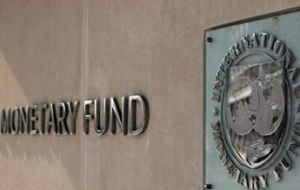MercoPress. South Atlantic News Agency
Long lasting consequences of the global financial crisis, according to IMF
 IMF studied 88 bank crises during the last 40 years
IMF studied 88 bank crises during the last 40 years The global financial crisis is likely to leave long-lasting scars on the world economy, but governments can act to stimulate a quicker revival and counter output losses, according to a new IMF study.
The study finds that banking crises typically have a long-lasting impact on the level of output, although growth eventually recovers. Lower employment, investment, and productivity all contribute to sustained output losses. While there is a strong association between the initial economic conditions and the size of the ultimate output loss, short-run macroeconomic stimulus and sustained structural reform efforts may help reduce ultimate output losses, according to the study released as part of the IMF’s World Economic Outlook (WEO).
The findings, according to authors Ravi Balakrishnan, Petya Koeva Brooks, Daniel Leigh, Irina Tytell, and Abdul Abiad, suggest that the forceful macroeconomic policy response so far may help mitigate the losses. Implementing structural reforms could also help to limit output losses, says the report, “What’s the Damage? Medium-term Output Dynamics after Financial Crises,” published as Chapter 4 of the WEO.
The IMF will publish its full global economic forecast on October 1 in Istanbul. But even as the global economy begins to recover from the most severe financial crisis since the Great Depression and the deepest recession since World War II, financial systems remain impaired and domestic and external imbalances persist in many economies.
In this context, the study uses the aftermath of past financial crises to provide useful insights into the medium-run prospects for economies currently recovering from the present crisis. Specifically, what happens to output over the medium run following financial crises? And what can be said about the role of policies after a crisis?
To answer these questions, the study looks at the medium-term output dynamics after 88 banking crises in advanced, emerging market, and developing economies over the past 40 years. The research also seeks to explain the substantial variation in medium-term outcomes, relating it to pre-crisis conditions and post-crisis policies.
For the average country, output per capita declines by about 10% of its pre-crisis trend and fails to rebound seven years after the crisis, although there is a large variation in outcomes across crisis episodes. This result holds for both advanced and emerging economies.
The good news is that, on average, banking crises do not seem to permanently decrease medium-term output growth, although the variation across country experiences is again substantial.
The depressed path of output after a crisis results from reductions of roughly equal proportions in the employment rate, the capital-to-labor ratio, and productivity.
While productivity may recover somewhat toward its pre-crisis trend over the medium run, capital and employment suffer enduring losses relative to the previous trend because the crisis depresses investment as the supply of credit becomes more limited. Also, the typically large increase in the actual unemployment rate tends to persist for a long time, as the crisis implies a substantial reallocation of labor across sectors.
Initial conditions have a strong influence on the size of the output loss. What happens to short-run output is a reliable predictor of the medium-term outcome. Also, a high pre-crisis investment share is a good predictor of large medium-term output losses.
The medium-run output loss is not inevitable. Some countries succeed in avoiding it, ultimately exceeding the pre-crisis trajectory. Although post-crisis output dynamics are hard to predict, the evidence suggests that economies that apply macroeconomic stimulus in the short run after the crisis tend to have smaller output losses over the medium run.
The study also finds some evidence that structural reform efforts are associated with better medium-run outcomes, although there is certainly no “one size fits all” when it comes to establishing the right policy after the crisis.
The authors say the analysis has sobering implications for the medium-term output prospects in economies that have suffered recent banking crises. The forceful macroeconomic policy response so far, in the form of substantial fiscal and monetary stimulus, should help to mitigate the crisis’ impact on output. Nevertheless, remaining concerns about losses underscore the importance of implementing reforms to help raise medium-term output and facilitate the shift of resources across sectors following the crisis.




Top Comments
Disclaimer & comment rulesCommenting for this story is now closed.
If you have a Facebook account, become a fan and comment on our Facebook Page!